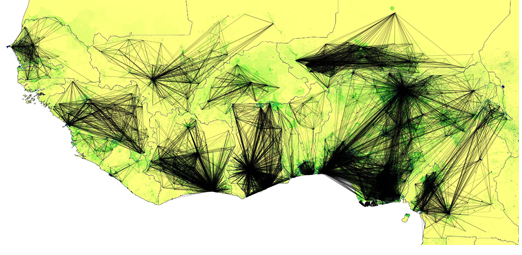Menu
A mobile phone company releases customer data -- and it's a good thing

When people travel, their cell phones are like digital footprints that let their phone company track their every move. Now that tracking data is being used to model how people in West Africa are moving within the area afflicted by the Ebola epidemic.
MIT Technology Review's David Talbot described in an August 21, 2014, article how the Swedish data-analysis firm Flowmaster created a model of regional transportation patterns in Liberia, Guinea, Sierra Leone, and neighboring countries. The model is based on data released by Orange Telecom that traces 150,000 phones registered to people in Senegal in 2013. The data was anonymized and aggregated, according to the companies.
It is also intended only to help predict the spread of Ebola, and not to plan any travel restrictions in the area, the firms insist. The data had already been authorized for release for another unrelated project, but security and privacy concerns persist. With some effort, the data could be unanonymized to identify the businesses and consumers associated with individual phones.
When you consider the potential of the data analysis to save lives, it's difficult to argue against release of the cell-phone information. This may be one instance where the public good outweighs the private interest.
MIT Technology Review's David Talbot described in an August 21, 2014, article how the Swedish data-analysis firm Flowmaster created a model of regional transportation patterns in Liberia, Guinea, Sierra Leone, and neighboring countries. The model is based on data released by Orange Telecom that traces 150,000 phones registered to people in Senegal in 2013. The data was anonymized and aggregated, according to the companies.
It is also intended only to help predict the spread of Ebola, and not to plan any travel restrictions in the area, the firms insist. The data had already been authorized for release for another unrelated project, but security and privacy concerns persist. With some effort, the data could be unanonymized to identify the businesses and consumers associated with individual phones.
When you consider the potential of the data analysis to save lives, it's difficult to argue against release of the cell-phone information. This may be one instance where the public good outweighs the private interest.
